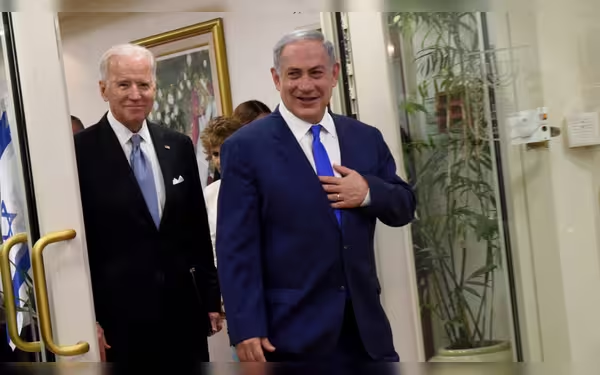Saturday, November 16, 2024 05:46 PM
Israel's Military Response to Iran: Netanyahu's Assurance to US
- Netanyahu assures US of limited military response.
- Israel vows to target only Iranian military sites.
- Biden warns against escalation in the Middle East.
 Image Credits: arabnewspk
Image Credits: arabnewspkNetanyahu assures the US of a limited military response to Iran, focusing on military sites amid rising tensions.
In recent developments, tensions between Israel and Iran have escalated significantly, particularly following a missile attack launched by Iran against Israel. This situation has drawn the attention of global leaders, especially in the United States, where President Joe Biden has expressed concerns regarding potential military actions that could further destabilize the region.
On Tuesday, Israeli Prime Minister Benjamin Netanyahu's office made it clear that while Israel values the opinions of the United States, it will ultimately act in accordance with its own "national interests." This statement comes in the wake of a report from the Washington Post, which indicated that Netanyahu had assured the White House that any military response from Israel would be limited to Iranian military sites, avoiding strikes on nuclear or oil facilities.
President Biden's cautionary stance is rooted in the desire to prevent a broader conflict in the Middle East, which could have dire consequences not only for regional stability but also for global energy prices. The ongoing conflict has already seen Iran launching approximately 200 missiles at Israel in retaliation for an Israeli strike that resulted in the deaths of key figures in Hezbollah and the Iranian military.
Defense Minister Yoav Gallant has stated that Israel's response to the Iranian missile attack will be "deadly, precise, and surprising," indicating a strong commitment to retaliate against any threats. This determination reflects Israel's long-standing policy of responding decisively to attacks, which it views as essential for its national security.
The dialogue between Netanyahu and Biden, as well as discussions involving U.S. Defense Secretary Lloyd Austin and his Israeli counterpart, highlight the delicate balance that both nations must maintain. While Israel seeks to protect its sovereignty and security, the U.S. aims to mitigate risks of escalation that could lead to a larger conflict.
As the situation unfolds, it is crucial for observers to understand the implications of these military strategies and diplomatic communications. The stakes are high, and the potential for miscalculation exists. Both nations must navigate this complex landscape carefully, as the consequences of their actions could reverberate far beyond their borders, affecting global peace and security.













